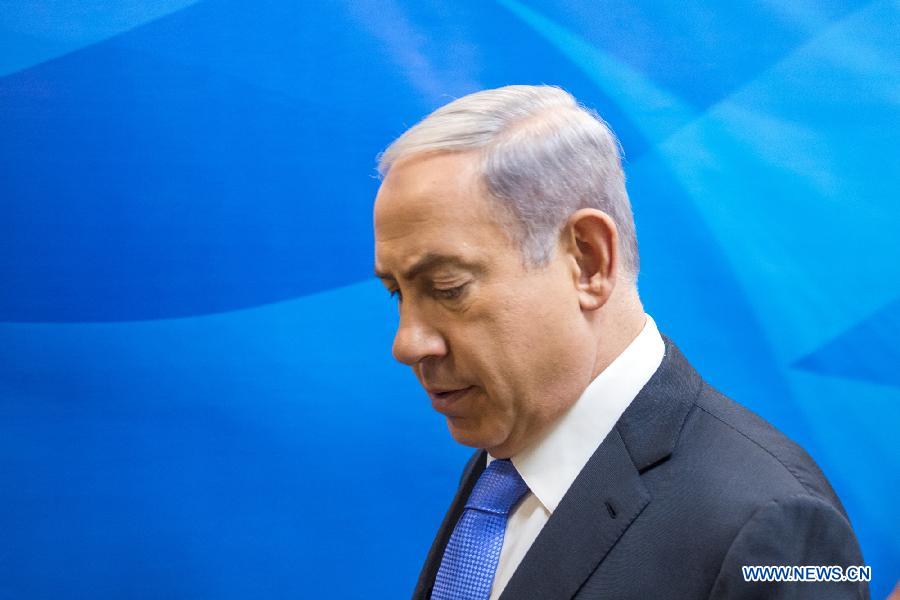
Israeli Prime Minister Benjamin Netanyahu arrives for the weekly cabinet meeting at the Prime Minister's office in Jerusalem, on July 19, 2015. Israeli Prime Minister Benjamin Netanyahu continued Sunday to lash out at the nuclear agreement with Iran, saying that the Islamic Republic deserves no concessions until it changes its foreign policy toward Israel and the United States. (Xinhua/JINI/Emil Salman)
JERUSALEM/TEHRAN -- Israeli Prime Minister Benjamin Netanyahu on Monday lashed out at the United Nations Security Council's unanimous endorsement of the nuclear agreement with Iran.
"The U.N. Security Council is giving its approval to that same country, which has systematically violated the Security Council's decisions and which calls for the destruction of Israel, a member of the UN," Netanyahu told a meeting of his Likud faction in Jerusalem, briefly before the vote was held.
Netanyahu also blamed the agreement for bringing war closer."They say that this agreement makes war more distant. This is not true; this agreement brings war closer."
He also sent a message to the U.S. Congress, calling them not to lift the sanctions on Iran. "As long as U.S. Congressional sanctions are in place, Iran will be compelled in the end to make concessions."
Lawmakers in the U.S. House of Representatives and in the Senate, who formally received a copy of the deal on Sunday, will review it in the next 60 days, before they will vote on whether to lift the sanctions imposed on Iran.
Netanyahu's statement was the last in a string of condemnations of the nuclear agreement that was announced last week in Vienna.
"I think the right thing to do is merely not to go ahead with this deal," Netanyahu told CBS news on Monday, amidst a blitz of interviews in U.S. media denouncing the deal, adding that "There are many things to be done to stop Iran's aggression and this deal is not one of them."
The hardliner prime minister, a long-time opponent of the deal, believes that lifting sanctions on Iran clears its way for acquiring nuclear weapons. Two additional nations including Saudi Arabia worry about possible increased Iranian influence in the Middle East.
The deal reached on July 14 between Iran and the six world powers -- the U.S., Russia, France, Britain, China, and Germany -- put Iran on the path of sanctions relief but impose more strict limits on its nuclear program.
As what is agreed, Iran will be removed all of the nuclear-related sanctions if the Islamic republic is proved to abide by the deal over the next ten years step-by-step.
On Monday, the UN Security Council unanimously endorsed the newly-reached agreement, kicking off a process to lift UN sanctions on Iran.
Earlier, Iran's Foreign Ministry said in a statement that Tehran is committed to its obligations under the deal.
"Iran is committed to sincerely implement its voluntary obligations under the Joint Comprehensive Plan of Action (JCPOA) provided that the U.S. and European sides do the same with regards to the removal of sanctions and restricting measures on Iran," wrote the statement posted on the official website of the foreign ministry.
Iran will continue its cooperation with the International Atomic Energy Agency (IAEA) to implement the additional protocol to ensure that its nuclear program has been and will remain peaceful, according to the statement.
Iran will also actively cooperate with its neighbors and the international community to counter terrorism and extremism to promote peace and stability, the statement read. Enditem